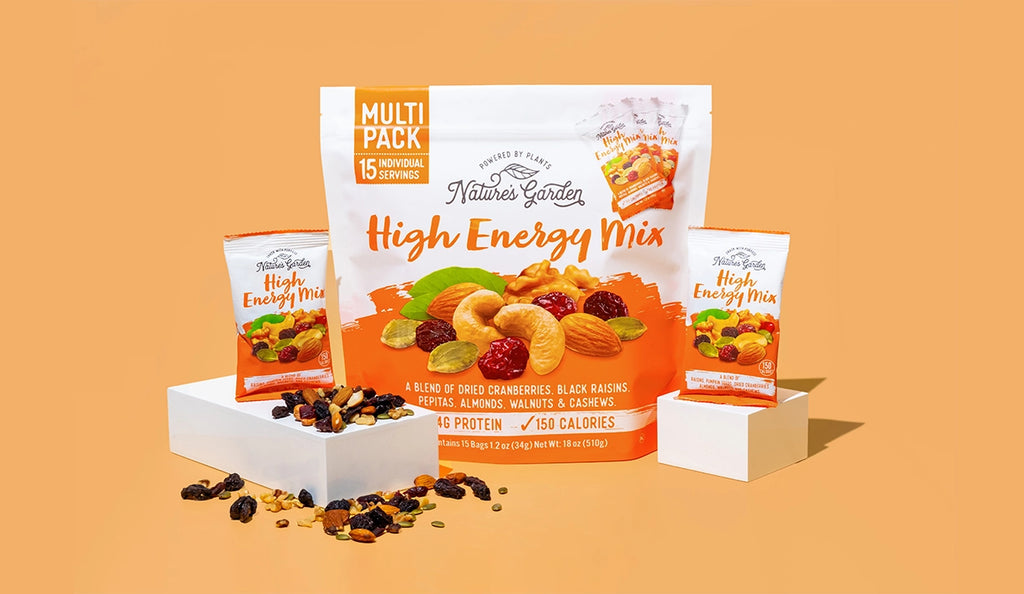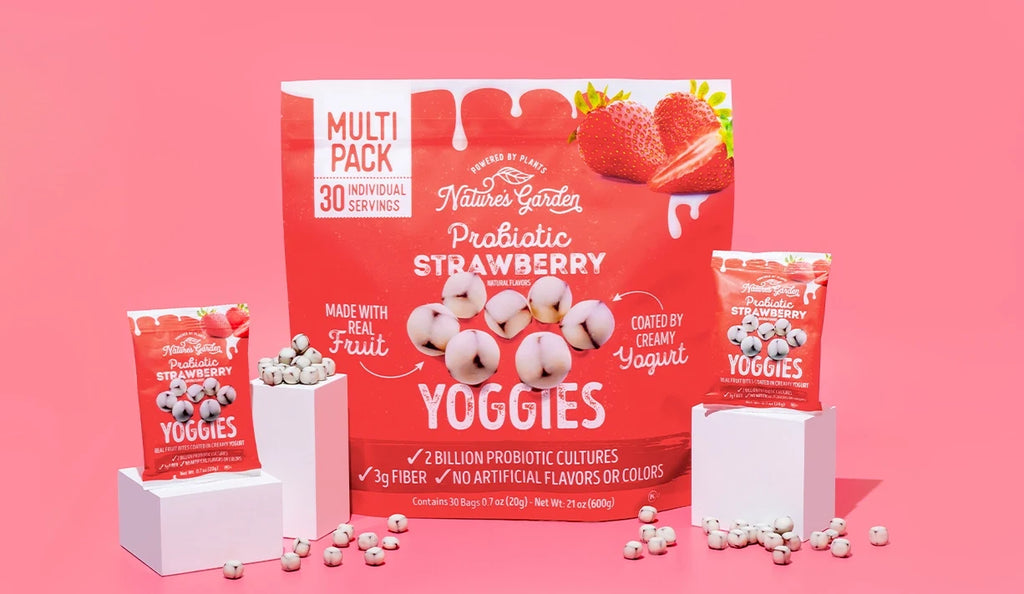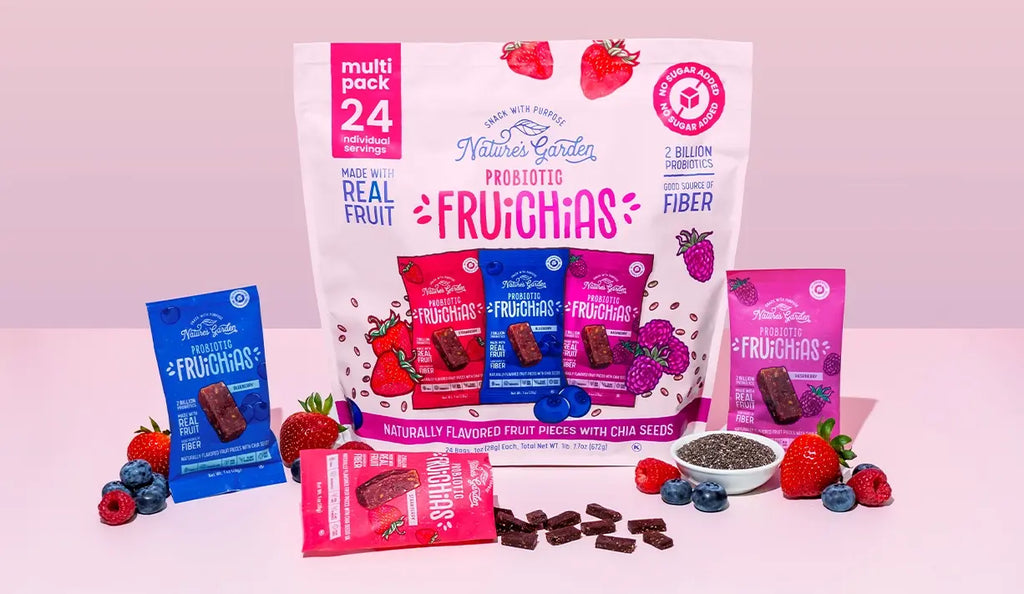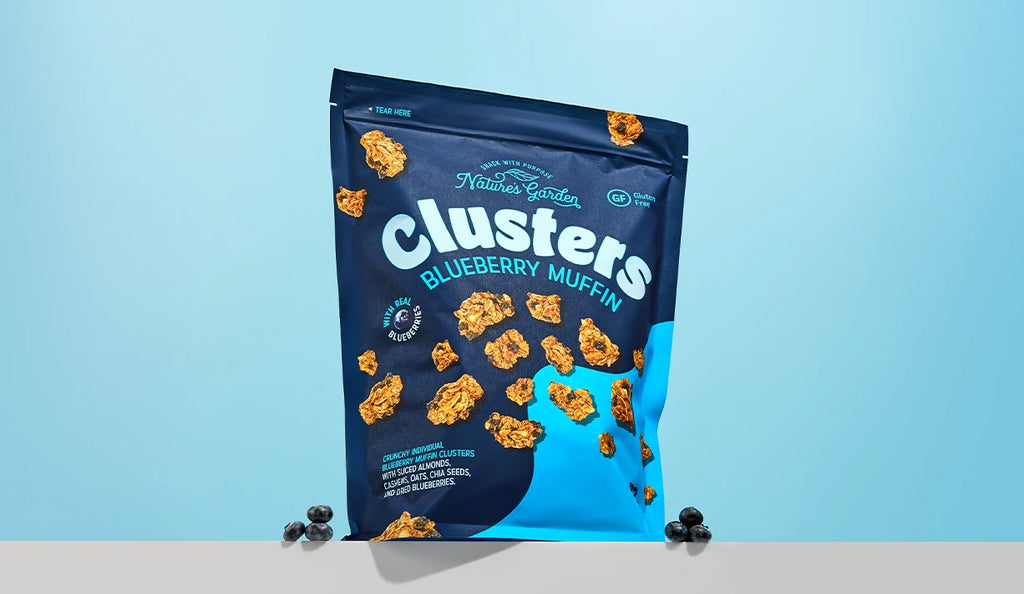At Nature’s Garden, we believe that snack time is your special time.
It’s a time to unwind, to put life on pause, to savor and indulge.
We believe that savvy snacking is one of the most important changes you can make to lead a happier, healthier lifestyle. This means choosing snacks that support your body, rather than filling it with nasties like GMOs, sugar, and cholesterol.
This is why we focus on making the most drool-worthy and nutritious snacks we can. In fact, our Research & Development Team is in our lab day in and day out – testing, tasting, and perfecting each Nature’s Garden product.
It’s important to us that the snacks we make satisfy a lot more than just your taste buds.
And that’s where functional snacking comes in!
What are the functional ingredients in snacks?
Functional snacking is snacking that does magic for your body by providing extra nutrition between meals. It means choosing snacks that have a high content of vitamins, minerals, fiber, protein, healthy fats, and probiotics.
Essentially, any snack provides a tangible benefit in combination with calories. Luckily for you, every snack we create here at Nature’s Garden has a functional benefit. Some snacks more than others. We know our customers are looking for snacks that help them conquer the day, whatever that entails. Our customers are busy parents, outdoor adventurers, movers, and shakers, and overall, people just like you who are committed to living a healthier life.
Our new Functional Trail Mixes put functionality at the forefront. All the ingredients in our new mixes were carefully selected by our R&D team on the basis of quality, flavor, and above all else, function. We sourced only the highest quality, freshest nuts and combined them with fruits, chocolate, and other tasty bites to create trail mixes that are all about performance and pleasurable snacking.
Read on to learn more about the functions and core benefits of some of the ingredients in our new Functional Trail Mixes.

Everything you need to know about Walnuts
What is the history of walnuts?
Walnuts are the oldest tree food known to man, dating back to 7000 B.C. The Romans called walnuts “juglans regia” meaning “Jupiter's royal acorn.”
Why is walnut called so?
The term "walnut" comes from the Old English word "wealhhnutu," which means "foreign nut." This likely refers to the fact that walnuts were originally introduced to England from ancient Persia (modern-day Iran) during the Roman Empire's rule. The Latin name for the walnut tree is "Juglans regia," which means "royal nut of Jupiter," as the ancient Romans believed the tree was a gift from the god Jupiter. The name "walnut" eventually became widely used in English to describe the tree and its edible nuts.
Walnut main benefits
- Heart Health Benefits: Walnuts are high in monounsaturated and polyunsaturated fats, which can help reduce bad cholesterol levels and lower the risk of heart disease.
- Brain Health: Walnuts are a great source of omega-3 fatty acids, which have been shown to improve cognitive function and reduce the risk of neurological disorders.
- Anti-inflammatory properties: Walnuts contain antioxidants and anti-inflammatory compounds that help to reduce inflammation throughout the body, which can help to protect against chronic diseases.
- Weight management: Despite being high in calories, walnuts can actually help with weight management. Their high fiber content can help keep you feeling full and satisfied, which can reduce your overall calorie intake.
How many walnuts should I eat a day?
The recommended daily intake of walnuts may vary depending on factors such as age, sex, weight, and health status. However, the American Heart Association recommends consuming a serving of nuts, including walnuts, at least four times a week as part of a heart-healthy diet. A typical serving size is around 1 ounce or 28 grams, which is roughly seven whole walnuts. It is important to note that walnuts are high in calories, therefore, for a balanced diet it is best recommended to consume in moderation. (1)
What is the best time to consume walnuts?
Walnuts are a delicious and nutritious snack that can be enjoyed at any time of day. But, have you ever wondered what the best time to consume walnuts is? Well, wonder no more! In this blog post, we'll take a look at the best time to enjoy this healthy nut.
First of all, it's important to note that there is no right or wrong time to eat walnuts. You can consume them as a snack throughout the day, add them to your meals, or use them as a topping for your favorite dishes. However, there are some benefits to consuming walnuts at specific times of the day.
For starters, consuming walnuts in the morning can be a great way to kick-start your day. The high protein and fiber content in walnuts can help keep you feeling full and satisfied, which can reduce your overall calorie intake throughout the day. Additionally, the omega-3 fatty acids in walnuts can help improve cognitive function, which can help you stay focused and alert throughout the day.
Consuming walnuts as a midday snack can also be beneficial. The protein and fiber in walnuts can help keep you energized and focused, which can help you power through the rest of your workday. Plus, snacking on walnuts can help prevent overeating during meal times.
Lastly, consuming walnuts in the evening can be a great way to wind down after a long day. The melatonin in walnuts can help regulate sleep cycles and improve the quality of your sleep. Additionally, the high protein content in walnuts can help repair and build muscle tissue while you sleep.
Our new V-Good Trail Mix features walnuts in addition to a blend of almonds, pumpkin seeds, black raisins, cranberries, and oat milk dark chocolate. This functional trail mix is a healthy snack that will fire up your body with the vitamins and minerals essential for boosting energy.
Everything you need to know about Cranberries
Where did cranberries originate from?
The history of cranberries is older than the recorded history of America. Long before the first European settlers arrived, Indigenous people ate cranberries for food but also used them as medicine and clothing dye.
What are the benefits of Dried Cranberries?
Cranberries are versatile fruit with a wide range of functionalities in our lives. One of the most significant functionalities of cranberries is their ability to promote good health. Cranberries are rich in antioxidants and phytonutrients, which have been shown to have a wide range of health benefits, such as reducing inflammation, boosting immunity, and improving cardiovascular health. One of the most well-known functionalities of cranberries is their ability to prevent and treat urinary tract infections (UTIs). Cranberries contain compounds called proanthocyanidins (PACs), which can prevent bacteria from attaching to the walls of the urinary tract and causing infection. Regular consumption of cranberries or cranberry juice has been shown to reduce the risk of recurrent UTIs. (2)
How many cranberries should I eat a day?
The recommended daily intake of dried cranberries may vary depending on individual factors. However it is important to note that it is best to consume in moderation, a good starting point would be to consume 1/4 to 1/2 cup (approximately 40-80 grams) of dried cranberries per day as a part of a balanced diet.
Is it good to eat cranberries everyday?
Dried cranberries can be high in added sugars, which can contribute to weight gain and other health problems when consumed in excess. Therefore, it is best to consume dried cranberries in moderation as part of a balanced diet that includes a variety of whole foods such as fruits, vegetables, whole grains, lean proteins, and healthy fats.
The power of our Berry Bliss Mix starts with the fruits – cherries, blueberries, and chocolate-covered cranberries. Each of these fruits, and the small amount of chocolate, provide a burst of antioxidants and Vitamin E to the body, effective in keeping your body feeling its best.
Everything you need to know about Almonds
What are some historical facts about almonds?
Originating in Western and Central Asia, almonds grew wild and were likely foraged by our ancestors before their domestication in 4000 B.C. Almonds were then cultivated across Asia.
Are almonds good for cholesterol?
Almonds are a nutrient-dense food that has been shown to positively impact blood pressure and cholesterol levels. The high levels of monounsaturated and polyunsaturated fats in almonds can help lower LDL (bad) cholesterol levels and reduce the risk of heart disease.
Finally, almonds are a good source of magnesium, which has been linked to lower blood pressure levels.
A study published in the Journal of the American Heart Association found that consuming almonds as part of a healthy diet can lower blood pressure levels, which can reduce the risk of heart disease and stroke. Almonds also contain fiber, which can help regulate blood sugar levels and improve overall heart health. Including almonds as part of a healthy diet can be a simple and delicious way to support heart health and maintain healthy blood pressure and cholesterol levels.
Additionally, according to a study, almonds can boost gut microbiota. Posted on October 29, 2022, by Robby Berman Alexandra Sanfins, Ph.D., fact-checked the information.
A new study has revealed that eating 56 grams of almonds daily — the equivalent of around 46 almonds — can improve gut health by boosting levels of butyrate. (3, 4)
Featured In: ALL OUR NEW MIXES!
All our new Functional Trail Mixes feature only the freshest, highest quality almonds sourced responsibly from sustainable farms. This means each mix is designed to be tasty, indulgent, and totally functional!
Don’t forget to check out how Omega-3 functions!
Get your hands on all four new Functional Trail Mixes from Nature’s Garden before they sell out!

















